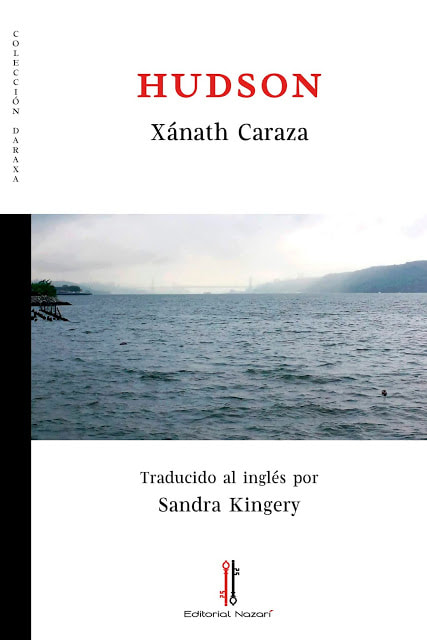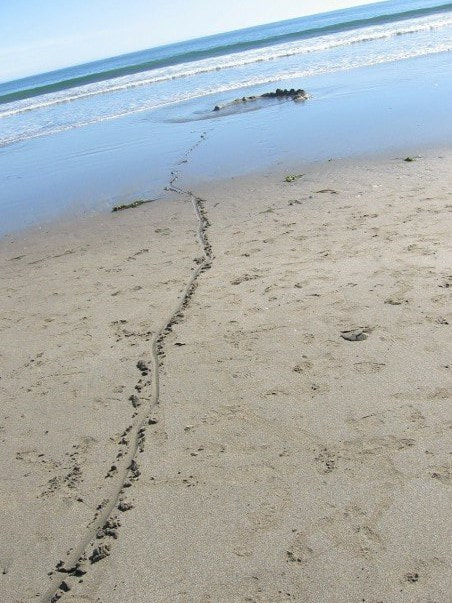Un extracto de Hudson / An extract from Hudson Commentary/comentario por/by Lucha Corpi 9. Es el dolor de un pueblo el que se desliza en la sangre de la tierra. Acantilados bermejos contienen la angustia y las rítmicas palpitaciones. La gente murmura en las doradas esquinas de la ciudad, se desliza la esperanza con sutileza acuática. ¿dónde están los héroes del agua? ¿dónde las mujeres pez que cantan en la aurora? ¿dónde las ilusiones del nuevo amanecer? Todo se inunda. Escurre la lluvia en los cristales, de los acantilados brota el agua densa. Canta, mujer pez, canta. 9. It is the people’s pain sneaking into the blood of the land. Crimson cliffs contain the anguish and rhythmic palpitations. People murmur in the golden corners of the city, hope slips away with aquatic subtlety. where are the heroes of the water? where the fish women and their song of first light? where the illusions of the new dawn? Everything becomes flooded. Rain drips down window panes, dense water sprouts from cliffs. Sing, fish woman, sing. 12. Hay corrientes que llevan el silencio entre sus densas aguas. Hudson de caudales de azogue. Afuera el ruido que dejan las aves transitorias. La luz rompe las nubes, relámpago que se entierra en las frondas. Trueno apasionado, el agua y el viento escarifican la piel de la tierra. Sangra el silencio, el agua corre y la tierra pulsa contenidos deseos. 12. There are currents that transport silence amid their dense waters. Hudson of quicksilver fluidity. Outside the noise left by transitory birds. Light shatters the clouds, lightning bolt buried in the foliage. Impassioned thunder, water and wind lacerate the flesh of the land. Silence bleeds, water flows and the land pulsates restrained desires. 34. Medita en este navegar mecánico. No queda nada, solo el angustiante ulular del viento antes de llegar al agua. Tiemblan las suaves manos al escribir, son las dueñas de los pensamientos salvajes, de la ira de los oprimidos. Agua del Hudson: despierta y desenraiza el dolor: las pesadillas de niñez que se hacen realidad. 34. Meditate in this mechanical navigation. Nothing remains, only the agonized keening of the wind before it reaches the water. Soft hands tremble as they write, they possess fierce thoughts, the fury of the oppressed. Water of the Hudson: awake and uproot the pain: the nightmares of childhood that become reality.  Xánath Caraza es viajera, educadora, poeta y narradora. Enseña en la Universidad de Missouri-Kansas City. Escribe para Seattle Escribe, La Bloga,Smithsonian Latino Center yRevista Literaria Monolito. Es laWriter-in-Residence en Westchester Community College, Nueva York desde 2016. En 2014 recibió la Beca Nebrija para Creadores del Instituto Franklin, Universidad de Alcalá de Henares en España. En 2013 fue nombrada número uno de los diez mejores autores latinos para leer por LatinoStories.com. Su poemarioSílabas de viento recibió el 2015 International Book Award de poesía. Sus poemarios Lágrima roja, Sin preámbulos, Donde la luz es violeta, Tinta negra, Ocelocíhuatl, Conjuro y su colección de relatos Lo que trae la marea han recibido reconocimientos nacionales e internacionales. Sus otros poemarios son Hudson, Le sillabe del vento, Noche de colibríes, Corazón pintado y su segunda colección de relatos, Metztli. Ha sido traducida al inglés, italiano y griego; y parcialmente traducida al portugués, hindi, turco, rumano y náhuatl. Xánath Caraza is a traveler, educator, poet, and short story writer. She teaches at the University of Missouri-Kansas City. She writes for Seattle Ecribe, La Bloga, The Smithsonian Latino Center, and Revista Literaria Monolito. She is the Writer-in-Residence at Westchester Community College, New York since 2016. Caraza was the recipient of the 2014 Beca Nebrija para Creadores, Universidad de Alcalá de Henares in Spain. She was named number one of the 2013 Top Ten Latino Authors by LatinoStories.com. Her book of poetry Syllables of Wind / Sílabas de viento received the 2015 International Book Award for Poetry. It also received Honorable Mention for best book of Poetry in Spanish in the 2015 International Latino Book Awards. Her books of verse Lágrima roja, Without Preamble, Where the Light is Violet, Black Ink,Ocelocíhuatl, Conjuro and her book of short fiction What the Tide Brings have won national and international recognition. Her other books of poetry are Hudson, Le sillabe del vento, Noche de colibríes,Corazón pintado, and her second short story collection, Metztli. Caraza has been translated into English, Italian, and Greek; and partially translated into Portuguese, Hindi, Turkish, Rumanian and Nahuatl.
Hudson (Editorial Nazarí, 2018) por/by Xánath Caraza, traducido por/translated by Sandra Kingery Comentario/Commentary por/by Lucha Corpi Xánath Caraza es y continuará siendo, sin duda, una de las voces poéticas más innovadoras en el idioma español. Hudson, su nueva colección de poesía, es más que un viaje por un río que fluye e inevitablemente vierte sus aguas en el mar. El río Hudson no es un río ordinario ya que sigue un curso doble. Por lo tanto nuestro viaje comienza en el punto de su origen, un estuario—un habitante en flujo constante—donde nace y también se vacía en el mar, donde cohabitan las faunas de agua fresca y salada. También fluye tierra adentro, provee rutas y caminos para la gente en las ciudades a lo largo de su cauce para también hacerlas prosperar. Le da vida a otro río en el camino. En el lecho del río Caraza escribe su “texto”—la historia del río, que es también la historia de la poeta. Las tumultuosas corrientes-salinas-frescas de agua se convierten en el tempo de su torrente sanguíneo. Guiados por los versos en negritas, incrustados en el texto, la poeta nos reta a buscar el espíritu del río—la belleza lírica. Una tercera lectura de los versos en itálicas nos lleva a un nivel más profundo, a los cuestionamientos filosóficos y búsqueda de vida que Caraza se hace y que todos nosotros cuestionamos en algún momento. He encontrado mucha riqueza en Hudson. Todo accesible, para lectores angloparlantes, a través de la bella traducción hecha por Sandra Kingery. Hudson es un libro que debe ser leído por poetas y amantes de la poesía—¡definitivamente por amantes de los ríos también! Bravo. Xánath Caraza is and will no doubt continue to be one of the most innovative poetic voices in the Spanish language. Hudson, her new poetry collection, is much more than a journey down any river that flows onward and inevitably empties its waters into a sea. TheHudson River is no ordinary river as it follows a dual course. So, our journey begins at the point of its origin, a tidal estuary—a habitat in constant flux—where the river begins and also empties into the sea, where salty and fresh water fauna cohabit. It also flows inland, providing routes and ways for people in cities along its course to prosper as well. It gives birth to another river along the way. On its riverbed, Caraza writes her “text”—the river’s story, which is also her story. The saline-fresh-water, restless currents become the tempo of her bloodstream. Guided by the verses in bold lettering embedded in the text, the poet challenges us to seek the spirit of the river—the lyrical beauty. A third reading of verses in italics takes us deeper into the poet’s mind, into Caraza’s lifelong quest for answers to philosophical questions all of us ponder from time to time. So much more richness I have found in Hudson. All made accessible to an English-speaking readership by the beautifully crafted translations of Sandra Kingery. Hudson is a must-read for poets and lovers of poetry—most definitely for lovers of rivers, too! Bravo. Lucha Corpi, poeta y narradora/poet and writer Oakland, CA, July/Julio de 2018
0 Comments
|
Archives
July 2024
Categories
All
|
Donate and Make Literature Happen
is published by the Somos En Escrito Literary Foundation,
a 501 (c) (3) non-profit, tax-exempt corporation. EIN 81-3162209





 RSS Feed
RSS Feed